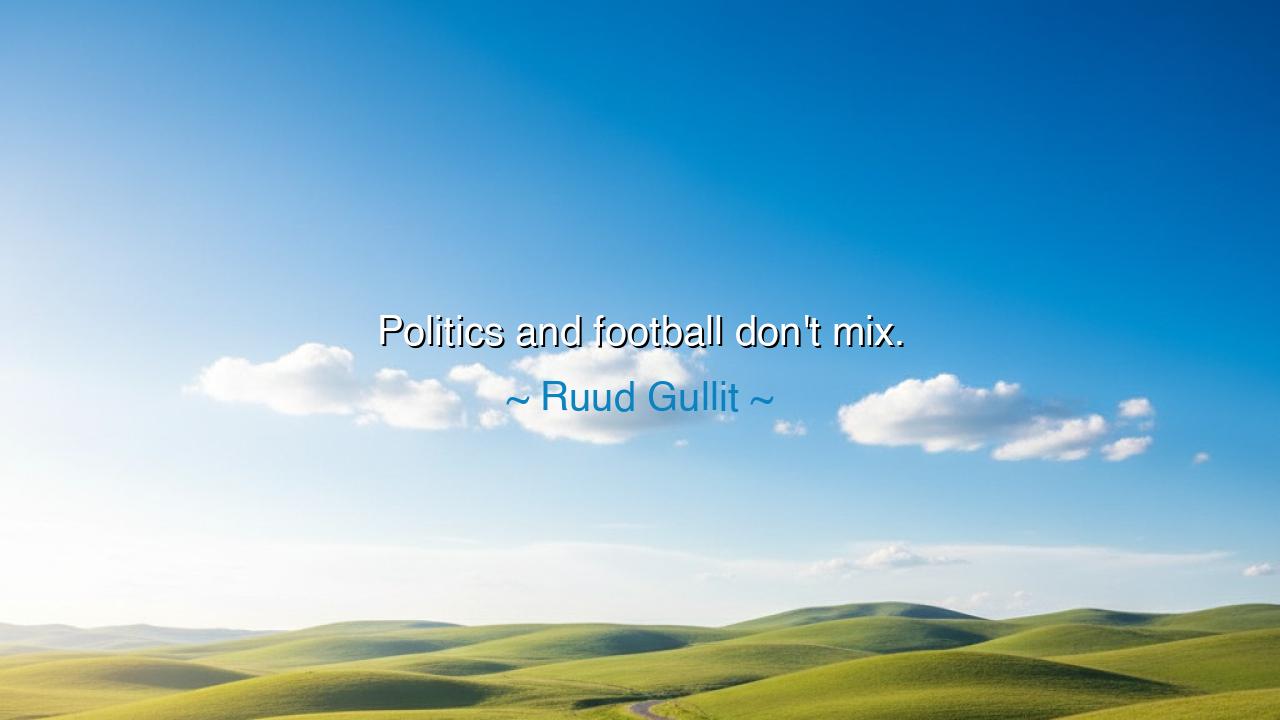
Politics and football don't mix.






The words of Ruud Gullit, “Politics and football don’t mix,” carry a warning born of experience and of sorrow. Football, the game beloved by millions, is meant to be a field where nations, classes, and peoples may meet in shared passion. It is the arena of skill, unity, and joy, where a goal scored binds strangers together in a single cheer. Politics, by contrast, is the art of division and contention, of power sought and power lost. To mix the two is to stain the purity of play with the bitterness of rivalry, turning the dance of sport into a battlefield of ideology.
History bears witness to this truth. Recall the 1970 “Football War” between El Salvador and Honduras, when a series of matches, instead of uniting two peoples, inflamed their tensions. Violence erupted, lives were lost, and what should have been a celebration of sport became the spark of bloodshed. Here we see Gullit’s wisdom: when political hatred invades the pitch, the beauty of the game is destroyed, and the ball itself becomes a weapon of enmity.
Even in more subtle ways, politics has bent football to its purposes. In Mussolini’s Italy of the 1930s, victories in the World Cup were not merely triumphs of athletic skill but were trumpeted as proof of fascist superiority. The athletes became pawns, their glory stolen by the state. Thus, football ceased to be the joy of the people and became instead the banner of a regime. The laughter of fans was drowned by propaganda, and the love of the game was shackled to ideology.
Yet, the true spirit of football is the opposite of politics. It unites where politics divides. In the World Cup of 1998, France lifted the trophy with a team of many races and backgrounds—Zidane of Algerian descent, Thuram of Guadeloupe, Desailly from Ghana. For a moment, the divisions of society were dissolved, and the stadium became a temple of brotherhood. This is football’s highest calling: to remind us that humanity can stand together, not as enemies, but as players in the same game.
So let the children of the future remember: keep politics from corrupting the sacred joy of play. Guard the game as a gift that transcends tribe and tongue. For when men and women gather to watch a ball roll upon the grass, they gather as one people, united not by ideology but by wonder. And in that moment, they taste a glimpse of harmony greater than any decree of kings or parliaments.






ATle pham anh tuyet
I see where Ruud Gullit is coming from when he says that politics and football don’t mix—it’s about preserving the entertainment aspect of the sport. But, is it possible to ignore how political issues like corruption, labor rights, and diversity affect the world of football? Isn’t it naive to think that football can be entirely apolitical when it’s part of the broader social fabric that reflects real-world issues?
TTNguyen Thanh Thanh
Gullit’s comment about politics and football not mixing may be idealistic, but is it truly possible to separate the two in a world where athletes have such a strong influence? Politics is deeply embedded in all areas of life, including sports. Shouldn’t football, as a reflection of society, acknowledge the political issues that players and fans care about? Or do we risk sanitizing the sport by keeping politics out of the conversation?
HNhuy Ngo
While I understand Ruud Gullit’s desire to keep politics out of football, I can’t help but feel that sports and politics have always been intertwined in some way. Athletes like Colin Kaepernick and the 2020 Black Lives Matter protests show that sports are often an essential platform for addressing political and social issues. Shouldn't football, as a global sport, have a responsibility to acknowledge and engage with societal concerns?
HHannie
Gullit’s perspective that politics and football don’t mix feels like a call for a more pure form of sport. However, with players and teams increasingly becoming involved in social issues, can football really remain separate from politics? Is it fair to expect athletes to avoid addressing political or societal issues, especially when they have such a large platform? Can’t football be a vehicle for social change as well as entertainment?
HHi
Ruud Gullit’s statement about politics and football not mixing raises an interesting point about the separation of sports and political influence. While football is often seen as a neutral space for entertainment, can politics truly be kept out, especially in today's globalized world? How can we ignore the social and political issues that affect players, fans, and teams, such as racism or economic disparity? Is it realistic to expect football to remain apolitical?